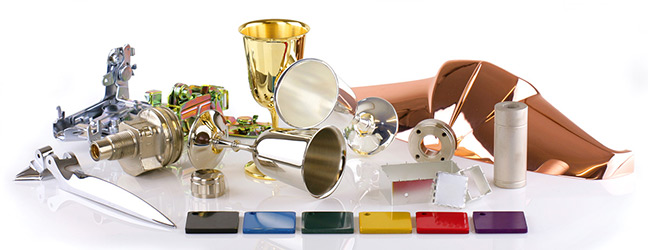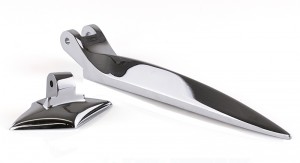A Brief Guide to Chrome Plating
Chrome plating is the process of electroplating a thin layer of chrome onto a metal or plastic object. Chrome plating services are beneficial for decorative or practical purposes. Dorsetware is one of the leading suppliers of chrome plating in Hampshire and BSI certified. We have been serving the metal needs of customers since 1969 and skilled in chrome plating services.
What is Chrome?
Chrome is a metal and one of the naturally occurring chemical elements, otherwise known as Chromium. Chrome in its solid form is not practical but the properties it contains are valuable when layered on other metals. We perform chrome plating on metals such as aluminium, stainless steel, brass, copper or plastic.
A chrome finish is often confused with other chemicals that give a shiny aesthetic. It is similar in appearance to metals like polished aluminium and electro polished stainless steel. Chrome plating is a brighter, bluer and more mirror-like finish. It also creates a more accurate reflection compared to other finishes.
What is chrome plating used for?
Chrome plating provides increased corrosion resistance and surface hardness. It is also useful for easing the maintenance process of the metal or for purely decorative purposes.
How is chrome plating applied?
Chrome plating is the skilled practice of electroplating a thin layer of chrome onto a metal or plastic object. It is best applied by a certified chrome plating company like Dorsetware. Firstly, we assess the quality of the base material as well as the desired result of the finish. We then strip the base materials to reveal the bare metal and all dirt, oil, paint, rust and then remove the old plating.
Secondly, we polish the bare metal using sanding belts and abrasive wheels. This removes any pitting, scratches and impurities for a smooth finish. Subsequently, we perform the surgical cleaning process using soap, acid and water solutions. This is essential before plating as any foreign matter can cause the plating to reject.
Thirdly, Dorsetware adds copper plating to offer an additional layer of corrosion protection. This also fills in pits or polishing lines before being re-buffed and surgically cleaned again.
Fourthly, we apply nickel plating for another layer of protection and to improve the deep lustre appearance of chrome. We then place the object into the chrome plating vat. This is where it warms to solution temperature and the electroplating process takes place. The length of time it spends in the solution corresponds to the desired thickness of the plating.
Lastly, we clean and polish the parts again and inspect for quality and finish.
What materials require chrome plating?
Chrome plating is typically applied to everyday household items and automotive parts including:
- Door knobs, handles and letterboxes
- Shower fittings, bathroom taps and toilet flush, chains, towel rings and roll holders.
- Interior and exterior lighting
- Interior and exterior car parts
- Motorcycle parts
- Moulds and press tools
- Valves and pumps
In summary, chrome plating is essential for objects that need to resist rusting, scratches and other imperfections.
Speak to a member of the team at Dorsetware for more information about chrome plating or to discuss our chrome plating services. Call us on 01202 677939 or fill out our online contact form.


